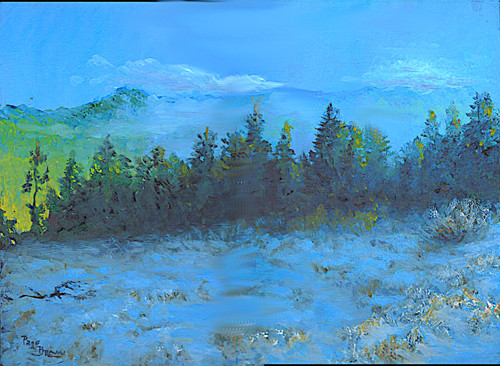Are you sure you want to perform this action?

Page Brown
I have something of a conflict here. A biography is suggested and, while I don't mind telling you about myself, I have a problem when it affects how the artwork is received. When you hang a picture on your wall the thing needs to speak for itself, and transcend biases of the present. It's OK to like or not to like something, but nonsensical to base that opinion on approval of the artist, his/her politics, or much else other than the artwork itself. It's just a waste of time.
What we make ought to be the thing, not what we are. An oil painting will be around for several hundred years with any luck. The artists will be dust long before, along with their vices and virtues.
Anyhow, that's my position...
I will say that I've been extraordinarily fortunate in my life's experiences and know, maybe better than most, how easily things could have gone the other way. And, on how many levels it could have been very different.
I was born in Memphis, Tennessee in July of 1941. Went through high school there, met my wife Evie when I was 15, she 14. We've been together pretty much since then. I went to the University of New Mexico for my freshman year. while she went to Spring Hill College in Mobile for her freshman and sophomore years. We came back to Memphis for the rest of college; I at Memphis State University (now the University of Memphis), where I majored in psychology with enough course work for minors in anthropology and philosophy.... I'll claim one or the other, depending on who is asking..
Art courses were not in the cards because I had little time for them. Plus, I couldn't see a career path—a delicate way of saying there seemed to be no money there. It still seems that way to me, with some notable exceptions, unless one also teaches, runs a gallery, or does something other than just "making art". None of it interests me, now or then.
After graduation, I went to work as a Welfare Worker for the Tennessee Department of Public Welfare (DPW) in 1963. I was there until 1967. That job provided a way to see the human condition through different eyes. Things aren't nearly as tidy as my southern, white, middle-class upbringing would have had them.
By 1967, Evie and I had three kids. DPW didn't pay much, but it was enough until, in July, I was offered a position as a Social Services Representative, Bureau of Indian Affairs (read that as "welfare worker"), at Fort Belknap Indian Reservation in northern Montana (there's that anthropology minor again). It paid a lot more and had housing for a rent payment that was less than Memphis' monthly utilities. So, off we went with three kids and a 1965 Rambler with a troublesome thermostat, stuffed with us, clothes, and no A/C. In August.
We were there for the next nine and a half year. We had a fourth child there in 1971. Starting in 1972, we spent a 18 months in California, where I received a Master's in Social Work from California State University at Sacramento.
Those years at Ft Belknap were the best of my adult life. Where else can a social worker do his social work thing, then go firefighting in the summer, hunting and fishing all year? Evie said it extended my adolescence. Probably. An older Indian woman told me, "Men 'shouldn't get married until they're 36. They just ain't settled down." I was 34 at the time and, I thought, mostly settled down. She must have meant Indian men, not all men..... I think.
In December of 1976, we packed up again and came to Denver where I went to work for the U.S Department of Health Education and Welfare (now Health and Human Services). Stayed there until retirement in February of 1994. By this time, all the kids were out of the house and on their own.
In April of 2001, Evie and I moved to Cape Coral, Florida for 12 years until my parents died, We then returned to Colorado.
After retirement and through the Florida years, I kept up with oil painting. I finally have it to a point at which I think the paintings might be of interest to others. And so, here I am.
